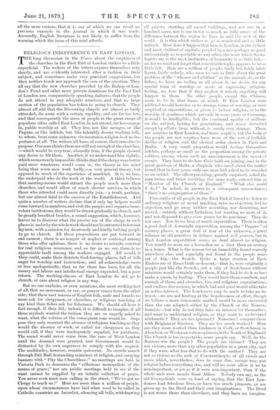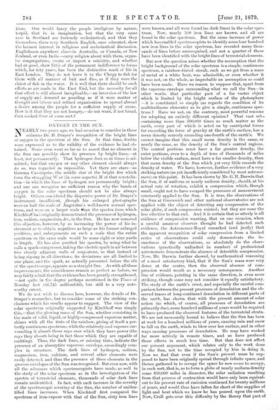RELIGIOUS INDIFFERENCE IN EAST LONDON.
THE long discussion in the Times about the emptiness of the churches in the East End of London strikes us a little superficial. The writers of the letters express themselves very clearly, and are evidently interested after a fashion in their subject, and sometimes make very practical suggestions, but they neither touch nor approach the core of the question. They all say that the new churches provided by the Bishop of Lon- don's Fund and other more private donations for the East End of London are, comparatively speaking, failures; that the people do not attend in any adequate numbers, and that no large section of the population has taken to going to church. They almost all add that the Dissenting chapels are almost as badly attended, die away with a certain rapidity, and are far too few, and that consequently the mass of people in the great range of populous cities called East London do not attend, far less engage in, public worship at all. They live, not like savages, or like Pagans, or like infidels, but like tolerably decent working folk, to whom, from some unknown circumstance, religion is of no im- portance at all. The writers all have, of course, their remedies to propose. One man thinks there are still not enough of the churches, —which would be very true, absurdly true, if the people showed any desire to fill them. Another, if we understand him rightly, which seems nearly impossible, thinks that if the clergy were better paid more wanderers would come in, the theory in his mind. being that worn men work badly,—a very general theory, but opposed to much of the experience of mankind. It is, we fear, the underpaid who do the work of the world. A third believes that meeting-rooms would attract the people much more than churches, and would allow of much shorter services, in which those who attended could more directly join,—a truth, perhaps, but one almost fatal to the success of the Establishment. And quite a number of writers declare that if only lay helpers would come forward in numbers, and visit the people, and organise bene- volent institutions, they would be drawn gradually to church, and be greatlybenefited besides, a sound suggestion, which, however, leaves us to discover what the precise use of the clergy in such places is, and why the whole work should not be entrusted to fervent laymen, with a mission for decorously and kindly bribing people to go to church. All these propositions are put forward in sad earnest ; there is no temper of neglect or contempt among those who offer opinions, there is no desire to mistake external for real religious reverence, and so far as we see, there is no appreciable fault among the workers engaged. All would, if they could, make their districts God-fearing places, full of folk eager for worship and instruction ; and all acknowledge, more or less apologetically, that so far there has been, for all the money and labour and intellectual energy expended, but a poor return. The working-classes of East London do not go to church, or care about religion iu any way.
But no one explains, or even mentions, the most striking fact of all, that no movement, or cry, or prayer comes from the other side ; that these vast masses of English folk, male and female, no more ask for clergymen, or churches, or religious teaching of any kind than fishes ask for fishermen. We should all hear it fast enough, if they did ; indeed, it is difficult to imagine, if all these myriads wanted the tuition they are so eagerly asked to want, what the volume of the consequent roar would be. Sup- pose they only resented the absence of religious teaching as they would the absence of work, or called for clergymen as they would call, if they were inadequately supplied, for publicans. The sound would never cease from the ears of West London until the demand were granted, and Government would be distracted by its own eagerness to comply with the request. The multitudes, however, remain quiescent. No crowds march through Pall Mall demanding ministers of religion, and carrying banners with " Pity the Churchless ;" no meetings are held in Victoria Park to denounce the " villainous monopolists of the means of grace ;" nor are public meetings held to see if the want cannot be supplied by an infinite collection of pence. You never even meet men calling in the street, " We've got no
Clergy to teach us !" Here are more than a million of people, upon whom circumstances have laid what used to be called in Catholic countries an Interdict, silencing all bells, withdrawing
all priests, shutting all sacred buildings, and not one in a hundred cares, nor is one in ten so much as fully aware of the difference between the region he lives in and the rest of the world. It is this which strikes us as so wonderful and so little noticed. How does it happen that here in London, in the richest and most civilised of capitals, peopled by a race perhaps as good
and certainly as respectable as any other, the want which Socio- logists say is the most instinctive of humanity is so little felt,— or, for we must not forget that conceivable reply, appears to be so little felt. Here are a million of people, fairly fed, fairly intel- ligent, fairly orderly, who seem to care as little about the great problem of the " whence and whither " as the animals do, or the fishes; to have no feeling at all about it, no desire for any special form of worship or mode of expressing religious feeling, no fear that if they neglect it utterly anything will happen to them. No other people, except the Chinese, seem to be in that frame of mind. If East London were addicted to odd heresies or to strange forms of worship, or were sceptical or superstitious, or given to indoor religion, or to the worship of goodness which prevails in some parts of Germany, it would be intelligible ; but the continual apathy of millions on the subject, lasting for generations, and never disturbed except by efforts from without, is surely very strange. There are sceptics iu East London, and fierce sceptics, but the body of the people are not sceptics, have none of the sort of irritable dislike of religion and the clerical order shown in Paris and Berlin. A very small proportion would declare themselves infidels, perhaps as small as the proportion among the private soldiers, among whom such an announcement is the rarest of events. They have to declare their faith on joining, and iu the great garrison of Malta, a chaplain who cared about the matter found that in four years only one man had asked to be recorded as an infidel. The officer presiding, greatly surprised, asked the man twice, and twice receiving the same reply, entered him as " Member of the Church of England." " What else could I do ?" he asked, in answer to a subsequent remonstance ; " there's no congregation of them."
tions. One would fancy the people irreligious by nature, torpid, that is, in imagination, but that •the very same race in Scotland are furiously ecclesiastical, and that they themselves, these very Southern English, once educated, show the keenest interest in religious and ecclesiastical discussion. Englishmen anywhere else—in Australia, or Canada, or New Zealand, or even India—carry religion about with them, organ- ise congregations, create or . import a ministry, and whether bad or good, show little of the permanent indifference to forms which, for fifty years, has been the distinctive mark of life in East London. They do not leave it to the Clergy to fish for them with all manner of bait and flies, as if they were the shiest of fish in the water. It is well that there should be such efforts as are made in the East End, but the necessity for all that effort is still almost inexplicable,—an inversion of the law of supply and demand as puzzling as if it were matter of thought and labour and refined organisation to spread abroad a desire among the people for a sufficient supply of ovens. How is it that they are not hungry,—do not want, if not bread, then cooked flour of some sort ?



































 Previous page
Previous page